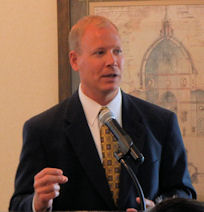
What would you want to know about ethics from a white collar crime lawyer? I had the privilege of hearing Latour “LT” Lafferty who practices with Fowler White Boggs, give me an inside look at the downward slide away from integrity and some practical advice on how to avoid it, when he presented at the June 21, 2011 luncheon for Association of Fundraising Professionals (AFP) Suncoast chapter.
Most interesting was Lafferty’s perspective of the white collar criminal. He suggested that these are not bad people. In fact they are just like us and the people we work with. What has happened is that their unethical behavior has built up like a snowball rolling downhill in a snow storm.
The example that Lafferty gave us was simple. Say that a person submits travel or business expenses that fall slightly outside the parameters, and he is not corrected. Perhaps he is even informally rewarded. Maybe “everyone” in the organization pads expenses. He continues to submit expenses that are farther and farther out of bounds until – bam! – he is investigated for his fraud and labeled a criminal.
How do we counter this behavior? Lafferty tells us that according to John Maxwell who wrote the book, A Winning Environment, we can:
- Hire people of good character
- Train them
- Inspire them with good leadership
Lafferty encouraged us to evaluate our organization’s culture and to lead in ethical behavior. He tells us that if we don’t expect, demand and reward ethical behavior, we are at risk of destroying our donor’s trust and our organization’s ability to thrive and achieve its mission. Yikes! I won’t name names, but we all know the organizations that have made the news headlines. The risk is real.
So what does that mean for the prospect researcher? While more and more researchers are finding their way to the management table many of us may feel we have little influence. I am a member of the PRSPCT-L community and the ethics issues raised online are very real and are likely to be just the tip of the iceberg. I believe anyone of any position in life can model ethics. Here’s how:
Care about ethics: Care that the donor prospects you research are treated with respect and dignity –by you!
Educate yourself: Maybe your organization won’t or can’t send to you APRA’s sensational conference, but you can participate in the list-serv discussions and read about issues of privacy and data generally –it’s everywhere! (Even Aspire Research Group has a fun 7-min. video on ethics)
Lead: Yes, I’m talking to you. All of us can lead. Open your mouth when talk of data and research arises. We can tell stories and introduce empathy with comments such as, “I read about that, but I didn’t put it in the profile because I would be so upset if someone treated me that way”.
We won’t always be heard. We won’t always be able to change the culture of our organizations. We will always be able to plant our ethical seeds and nurture them in ourselves and others. I can live with that. How about you?